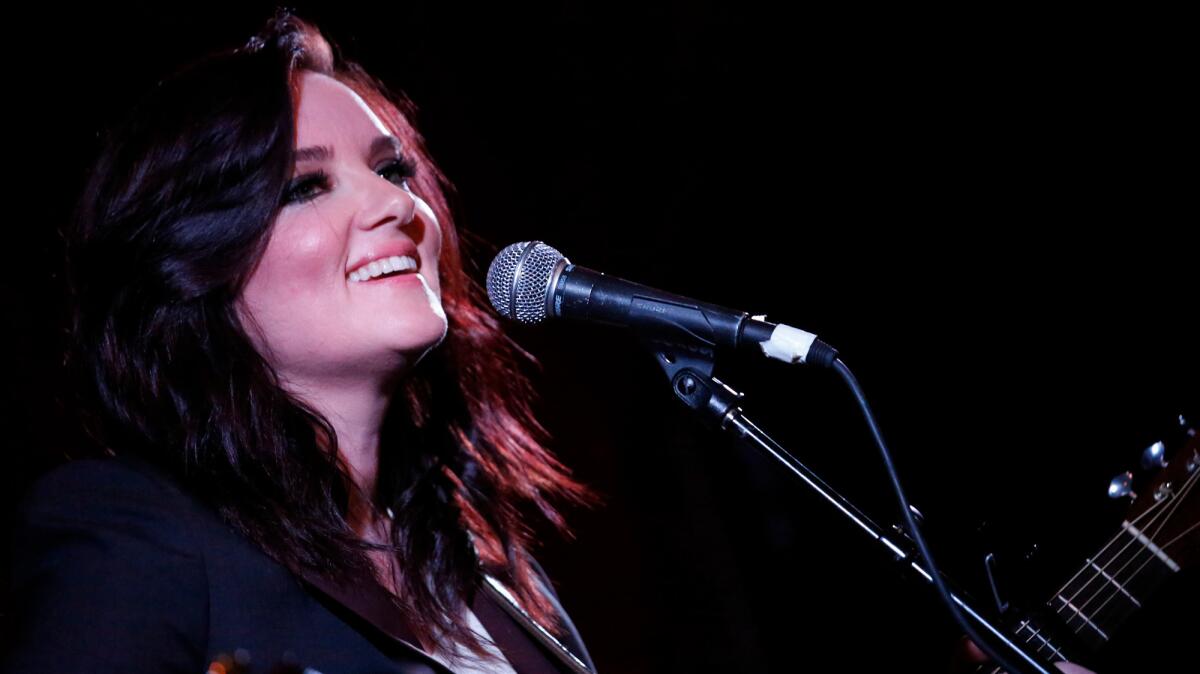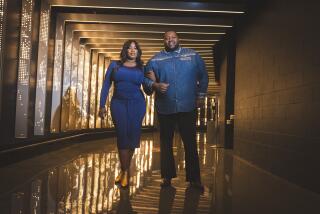Brandy Clark: Not your mama’s country artist

Listening to mainstream country radio these days can be like going on an ice cream run, says country singer-songwriter Brandy Clark. Sometimes there simply needs to be variety.
“If all they’re serving is vanilla ice cream, I’m going to eat vanilla, because I like ice cream,” the 39-year-old fast-rising artist said on a recent stop in Hollywood, the morning after she’d played one of her first headlining shows at the Hotel Café.
“But if you suddenly give me the choice of vanilla and strawberry and rocky road,” she said, her eyes opening wider, “my choices are going to be different. I think music’s like that. It sounds funny, but it’s like Baskin-Robbins — there ought to be 31 flavors.”
Clark’s been doing her best to expand the musical menu long before her sophomore album, “Big Day in a Small Town,” was issued Friday. Prior to the 2012 release of her critically acclaimed debut album, “12 Stories,” she had demonstrated the ability to not only be a first-rate songwriter but a stylish vocal interpreter as well.
On the rocky road to stepping into the spotlight — Clark was recently nominated for a new artist Grammy, an award that in 2015 went to crooner Sam Smith — she helped craft genre-bending hits for Miranda Lambert (“Not Your Mama’s Broken Heart”), The Band Perry (“Better Dig Two”) and Kacey Musgraves (“Follow Your Arrow”).
But since releasing “12 Stories,” she’s taken her place among a group of boundary-pushing acts that are bringing a fresh perspective to the world of mainstream country music. In recent years, the genre has been dominated by the “bro-country” likes of Luke Bryan, Jason Aldean, Florida Georgia Line and others — artists whose songs often focus on tailgate parties and nonstop good times.
Much of the music out of that camp sounds far removed from the emotionally rich and nuanced strain of traditional country practiced in previous generations by such standard bearers as Hank Williams, Johnny Cash, Loretta Lynn, Dolly Parton, Merle Haggard and Emmylou Harris.
“I have nothing against what has gone on,” Clark said. “But I think there’s a lot more out there than what’s necessarily represented.
“There are people who go out and seek music,” she said. “But my brother doesn’t. He’s working 60 hours a week, and what he listens to is what he hears on the drive to and from work. He’s going to listen to what’s being played for him. If he heard more diversity, he might like something different from what he’s used to liking.”
There’s a lot to like in Clark’s songs, which contain generous helpings of dark humor expressed in smartly crafted lyrics that waste few words or emotions.
“Brandy Clark is further proof of commercial country’s sea change,” Rolling Stone said in awarding “12 Stories” 3½ stars (out of 5). “Her debut is all airtight craftsmanship, sly wit and precise detailing that treats mainstream style like artisanal fast food.”
Among the appealing characteristics of her songs is her penchant for packing as much illuminating detail as possible into each verse and chorus. Notable too is her ability to extend the momentum of sentiments she’s exploring almost to the breaking point before resolving them.
Take her latest single, “Girl Next Door.” It’s the testament of a woman whose love interest seems put off by her rough edges, preferring someone with a temperament a bit more manicured.
If you want the girl next door
Some Virgin Mary metaphor
Your cardboard cutout on the wall
Your paper or your Barbie doll
With perfect hair and a perfect dress
Really just a perfect mess
I ain’t nothing less or nothing more
So baby, if you want the girl next door
Go next door
The goal, she says without a trace of ego behind it, is “I just don’t want people to get bored, and I don’t want them to go on autopilot [while listening],” she said, casting the idea as swimming upstream in the age of individual songs overshadowing full albums in the music business. “I want them to pay attention to all of it.”
Clark’s been paying dutiful and passionate attention to the music since she was a child growing up in the Pacific Northwest. Her parents filled their Morton, Wash., house with the music of Lynn, Haggard, Patsy Cline and other ’60s country greats.
Although she had started playing guitar at 9 and soon began writing songs, with her mother’s encouragement, she focused much of her teenage life on sports, attending Central Washington University on a basketball scholarship.
Clark moved to Nashville in 1998 to attend Belmont University and explore its famed music business courses. Once in the country music capital she began ramping up her songwriting efforts and soon landed a publishing deal.
For years, the songs she wrote herself or with various collaborators made it into the public’s ears by way of other singers’ voices.
Her song “Things a Mama Don’t Know” became a minor hit for Mica Roberts om 2008, and a couple of songs she co-wrote were recorded in 2010 by one of her musical heroes, Reba McEntire: “Cry” (which she wrote with frequent collaborator Shane McAnally) and “The Day She Got Divorced” (with McAnally and Mark D. Sanders).
Her big break came the following year, when Lambert recorded “Mama’s Broken Heart,” which Clark collaborated on with Musgraves and McAnally.
Rooted in the theme of a failed romantic relationship, the song outlines the difference between a 21st century woman’s response to what went wrong and the response of someone from a previous generation.
“Before I made this record, I said to my manager, ‘My audience is the mothers driving their daughters to the Taylor Swift concert.’ Nobody’s speaking to them, and I definitely feel that,” she said of her new album. “Lately I’ve been surprised at how much more more diverse my audience is than I knew.”
Her songs are rooted in the trials and tribulations of blue-collar life.
She casts a non-judgmental eye on folks who make due with generic soda because they’re broke, a woman whose teenage daughter surprises her by giving birth in the middle of her high school geometry class, and another who has to stop herself from romantic dreams because she’s facing the reality of raising three children without a partner.
Key to Clark’s point of view is “Daughter,” which she wrote with Jessie Jo Dillon and Jeremy Spillman. The song is about wishing that a philandering ex had a daughter so he might experience the torture he caused from the other side of the lens.
I hope you have a daughter and I hope that she’s a fox
Daddy’s little girl — just as sweet as she is hot
She can’t help but love the boys
Who love to love and leave them girls
Just like her father
Yeah, karma’s a bitch — I hope you have a daughter
She received howls of approving laughter when she tried the tune out in public for the first time at the Hotel Café show.
“People now make their own playlists on Spotify and iTunes,” she said. “I want to make music that’s so compelling that the whole record is their playlist.
“We definitely life in a fast-food society, and people sitting down to a whole meal is a rare thing,” she added. “When someone listens to my record, I want them to think, ‘Boy, that was really worth the 45 minutes I just spent.’”
ALSO:
The Kills find new life on ‘Ash & Ice’
Ed Sheeran’s ‘Photograph’ targeted in $20-million copyright infringement lawsuit
The CMT Music Awards should be a proudly wacky free-for-all. So what happened this year?
randy.lewis@latimes.com
Follow @RandyLewis2 on Twitter.com
For Classic Rock coverage, join us on Facebook
More to Read
The biggest entertainment stories
Get our big stories about Hollywood, film, television, music, arts, culture and more right in your inbox as soon as they publish.
You may occasionally receive promotional content from the Los Angeles Times.









